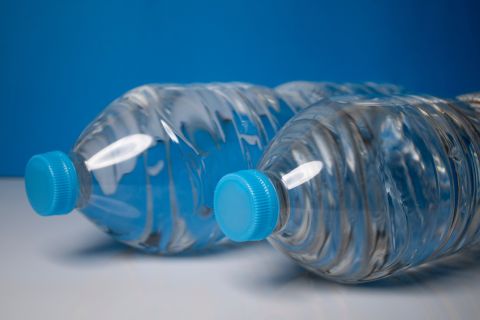Consumer groups launch EU-wide complaint against major water bottle producers for greenwashing
About this publication
Today, BEUC and member organisations* from 13 countries have reported to EU authorities misleading commercial claims about the recyclability of their products by major drinking water bottle traders, such as Coca-Cola, Danone and Nestlé Waters/Nestlé. According to our analysis, such claims do not comply with the EU rules on unfair commercial practices. This report was carried out together with ClientEarth and ECOS - Environmental Coalition on Standards.
The average European consumer drinks around 118 liters of bottled water per year and 97% of this water is packaged in plastic containers.1 Beverage bottles are one of the top sources of plastic pollution on European beaches.2 The beverage industry resorts to recyclability claims that according to our research are too vague, inaccurate or/and insufficiently substantiated. We identified three key claims of concern:
-
“100% recyclable”: This ambiguous term depends on many factors such as the available infrastructure to collect material, the effectiveness of the sorting process, or appropriate recycling processes. The recycling rate for PET beverage bottle bodies is estimated to be only 55% in the EU and the chance of it becoming a bottle again around 30%.3
-
“100% recycled”: This claim wrongly implies the full bottle is made entirely from recycled materials. The fact is that bottle lids cannot be made of recycled materials by EU law4 and labels are rarely made from recycled material either. In addition, adding virgin plastic (i.e., non-recycled plastic) to the body of the bottle is also a common practice.
-
Use of green imagery: Closed loops, green logos or nature images are used for branding many water bottles across Europe. They prompt the false idea of environmental neutrality, endless plastic circularity and may even give the impression that the bottles would have a positive impact on the environment.
BEUC and its members have filed a complaint to the European Commission and the network of consumer protection authorities (CPC), calling on them to launch an investigation. We call on authorities to ensure that traders stop misleading consumers by using such claims.
Ursula Pachl, Deputy Director General of BEUC, commented:
“Be it about buying new clothes, opening a bank account or buying water bottles, consumers increasingly want to make the most sustainable choice and seek reliable information to do so. However, they are bombarded with incorrect and deceptive claims, so they do not know which claim or label to trust."
“Using “100% recycled/recyclable” claims or displaying nature images and green visuals that insinuate that plastic is environmentally friendly is misleading consumers. Such claims however can be found on many water bottles sold across Europe. The problem is that there’s no guarantee it will be fully recycled once it’s in the bin. This greenwashing must stop."
“The EU is taking much welcomed steps5 with how to help clean up the market from deceiving green claims. However, it will take years before new regulatory measures will apply and there is no time to waste, so we expect authorities to take action quickly.”
Justin Wilkes, Executive Director of ECOS, added:
“Policymakers must set clear rules on recycled content that are implemented by standardised reliable methodologies, putting an end to the Wild West of green claims.”
Rosa Pritchard, Plastics Lawyer at ClientEarth, concluded:
“The reality is single use plastic is neither circular nor sustainable. Recycling can never catch up with the sheer volume of plastic produced on our planet. Companies are in a unique position to change how we consume but currently these claims – which we consider to be misleading – are making it hard for consumers to make good environmental choices.”
* BEUC member organisations participating in this action are: VKI (Austria); Асоциация Активни потребители (Bulgaria); CLCV (France); Kuluttajaliitto – Konsumentförbundet (Finland); EKPIZO and KEPKA (Greece); Tudatos Vásárlók Egyesülete (Hungary); Altroconsumo (Italy); Consumentenbond (Netherlands); Federacja Konsumentow - FK (Poland) DECO (Portugal), Spoločnosť ochrany spotrebiteľov (S.O.S.) (Slovakia); Zveza potrošnikov Slovenije (Slovenia); OCU and CECU (Spain). FRC (Switzerland) kindly supported this action by providing examples of claims.
About BEUC
The European Consumer Organisation (BEUC) acts as the umbrella group in Brussels for 45 independent national consumer organisations. Our main role is to represent them to the European institutions and defend the interests of European consumers.
About ClientEarth
ClientEarth is a non-profit organisation that uses the law to create systemic change that protects the Earth for – and with – its inhabitants. We are tackling climate change, protecting nature and stopping pollution, with partners and citizens around the globe. We hold industry and governments to account and defend everyone’s right to a healthy world. From our offices in Europe, Asia and the USA we shape, implement and enforce the law, to build a future for our planet in which people and nature can thrive together.
About ECOS
ECOS is an international NGO with a network of members and experts advocating for environmentally friendly technical standards, policies and laws. We ensure the environmental voice is heard when they are developed and drive change by providing expertise to policymakers and industry players, leading to the implementation of strong environmental principles.
1 United Nations University Institute for Water Environment and Health (UNU INWEH), Z. Bouhlel et al, ”Global Bottled Water Industry: A Review of Impacts and Trends” (March 2023), available online: https://inweh.unu.edu/wp-content/uploads/2023/03/UNU_BottledWater_Repor….
2 The Joint Research Center (JRC) of the European Commission, A. M. Addamo et al, “Top Marine Beach Litter Items in Europe: A review and synthesis based on beach litter data” (2017), available online: https://mcc.jrc.ec.europa.eu/main/dev.py?N=41&O=441 (Page 38).
3 The weight of material entering the recycling operation versus total weight of material placed on the market. Once losses in the recycling process are considered, the rate is likely to be even lower. Eunomia and Zero Waste Europe,” How circular is PET? A report on the circularity of PET bottles, using Europe as a case study” February 2022. https://zerowasteeurope.eu/library/how-circular-is-pet
4 Commission Regulation (EU) 2022/1616 of 15 September 2022 on recycled plastic materials and articles intended to come into contact with foods, and repealing Regulation (EC) No 282/2008 (Regulation on recycled materials for food contact applications).
5 The EU recently agreed on the Empowering Consumers in the Green Transition Directive which will among other better protect consumers against greenwashing (banning for instance carbon-neutral claims). Legislative work is ongoing on the Green Claims Directive, which aims to weed out unsubstantiated claims from the market.
Download:


